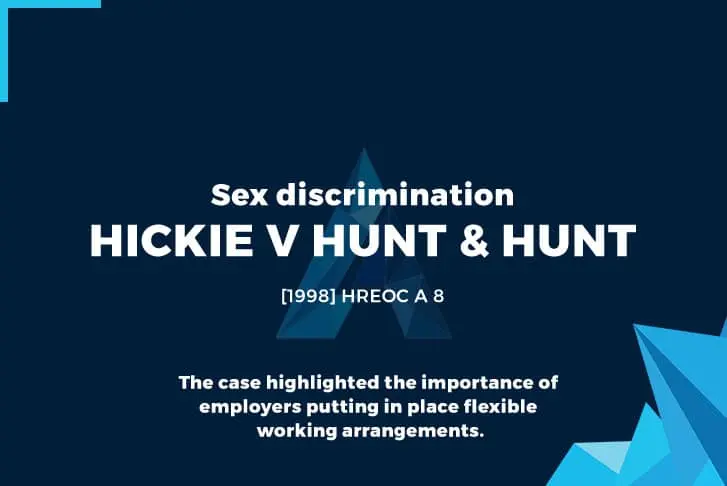Sex discrimination Hickie v Hunt & Hunt
CASES OF INTEREST
“Marea Hickie, a contract partner with Sydney law firm Hunt & Hunt, brought a complaint against her employer after her request to work part-time following the birth of her child was refused. She claimed the firm had given away her client base while she was on maternity leave. In a complaint heard by HREOC, Commissioner Evatt found that the law firm had indirectly discriminated against Ms. Hickie by requesting to work full-time in order to maintain her practice. The firm was ordered to pay $95,000 in compensation. The case highlighted the importance of employers putting in place flexible working arrangements.”
The Commission had to examine whether there was enough evidence to support direct or indirect discrimination. At that time, in order to prove direct discrimination there had to be an appropriate comparator, meaning, to compare one individual’s treatment against the general standard of treatment in the given organization. This would assist the Commission to decide whether the person in question has been directly discriminated against.
In contrast with direct sex discrimination, in order to prove indirect discrimination, Ms. Hickie had to prove that a requirement or policy existed which a substantially higher number of men than women could comply with. Ms. Hickie also had to show that she could not comply with the requirement and that the requirement was not reasonable in the circumstances.
The Commission found that the firm had indirectly discriminated against Ms. Hickie because the firm removed Ms. Hickie’s practice from her due to her intention to work part-time. This amounted to a requirement, policy, or condition that she work full-time to maintain her plaintiff practice.

The Commission further found that failing to renew Ms. Hickie’s contract amounted to indirect sex discrimination which was not reasonable in the circumstances. It was Commission’s view that the requirement to work full-time would disadvantage women. The firm’s own records showed that most part-time workers at the firm were women. The employer failed to prove that Ms. Hickie couldn’t complete all duties allocated to her showed that the requirement to work full-time was unreasonable.









SHARE THIS